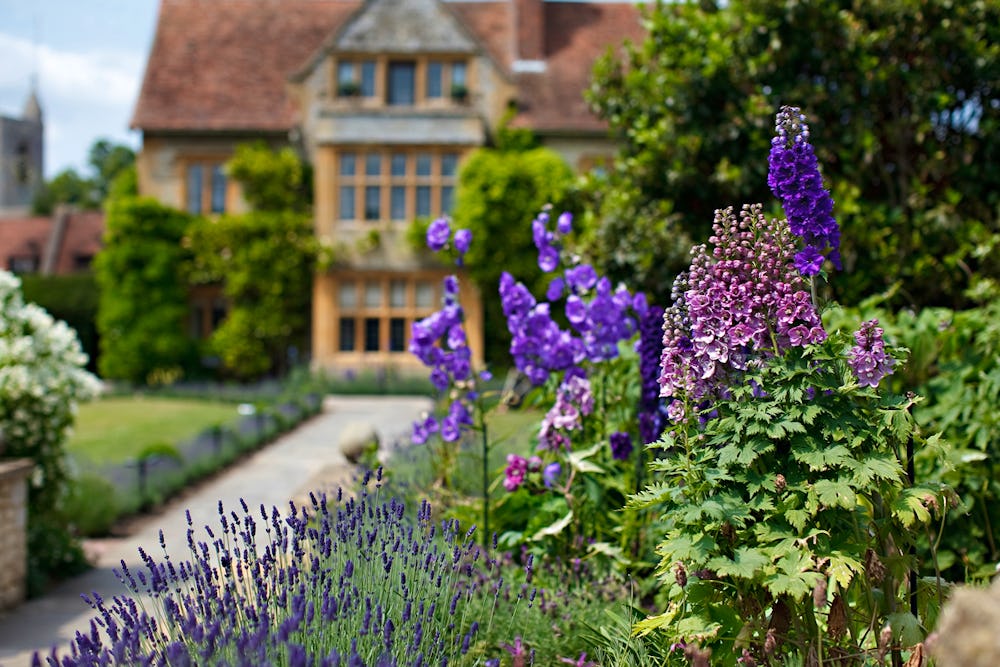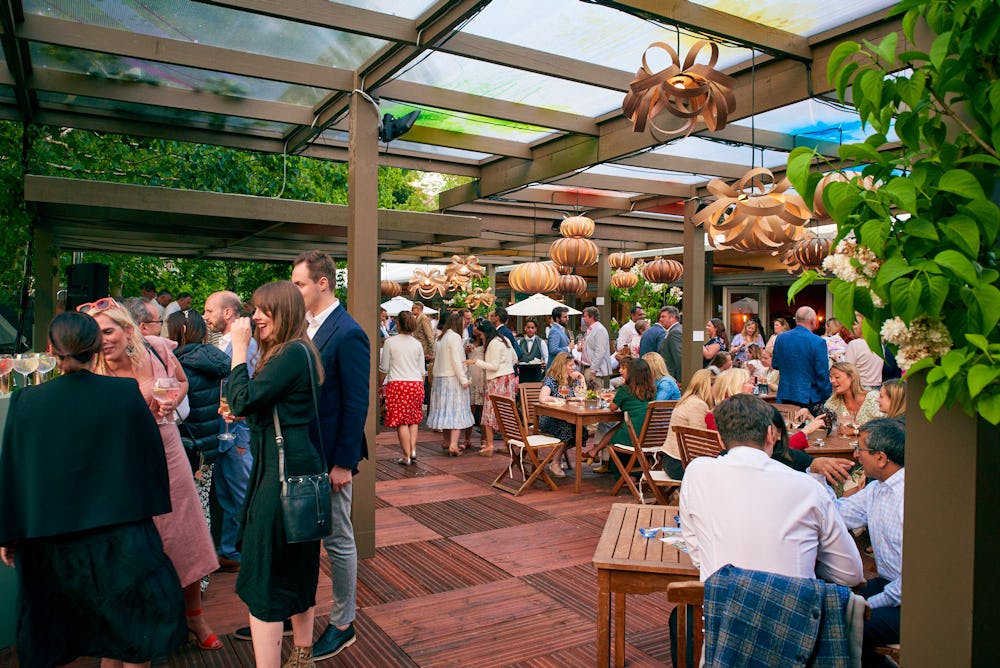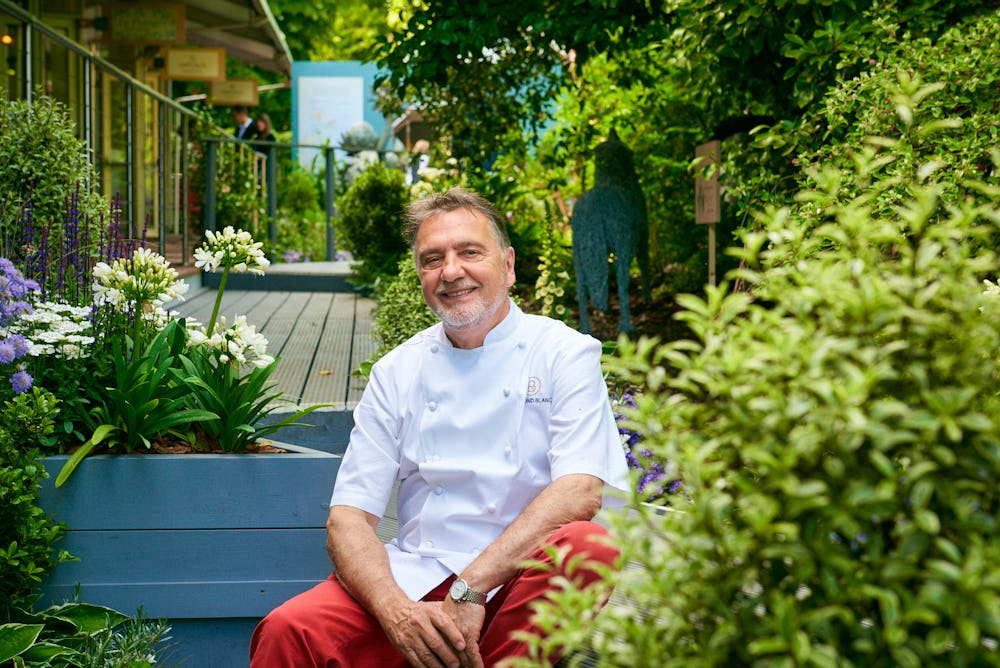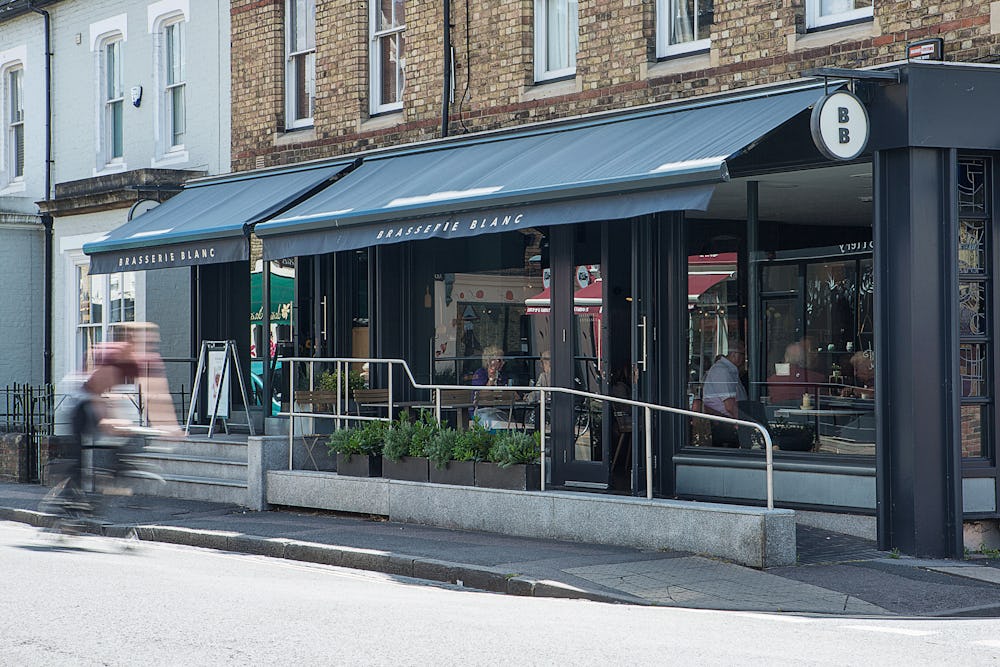Raymond Blanc was born in Besançon in 1949 and grew up in the eastern French region of Franche-Comté. He father taught him how to forage and fish, while his mother, Maman Blanc (his greatest inspiration) showed him how to cook what he brought back.
Blanc arrived in the UK in 1972 and set about educating les rosbifs about the pleasure of eating. He launched his first restaurant, Les Quat’ Saisons, in North Oxford in 1977, winning two Michelin stars along the way, before opening its successor, Le Manoir aux Quat’ Saisons, in the village of Great Milton east of the city in 1984. The first Brasserie Blanc opened in 1996 to bring simple, good-quality French food to a wide audience; there are now 17 branches around the UK. Blanc was awarded an OBE in 2008 in recognition of his services to the British food industry.
In May, Blanc returns to The RHS Chelsea Flower Show with Jardin Blanc, an all-day food and entertainment venue set in gardens designed by the Chelsea Flower Show Gold Medal winner Andy McIndoe and dotted with horticultural sculptures crafted by some of the country’s leading artists.
We caught up with Blanc to find out more about Jardin Blanc, the importance of gardens to gastronomy and how British food culture has changed since he arrived in the UK almost 50 years ago.
Why did you become involved in the Chelsea Flower Show with Jardin Blanc?
I have a deep understanding and love of gardens. I had a very rural upbringing and I learned from an early age how to grow food. Ninety per cent of the food that was produced in our garden would be eaten, or it would be preserved, pickled and dried over the winter. I am a totally self-taught chef and this was my apprenticeship. I learnt everything about the joy of food from my parents, not just how to grow and store it but the pleasure of the table. The kitchen is the centre of the home; it has a very powerful life force.
How important is the garden at Le Manoir aux Quat’Saisons?
The garden is at the centre of my gastronomy. When I came to Le Manoir, I fell in love with this gorgeous, beautiful house and the first thing I did was create an enormous garden. Now we have 12 gardens at Le Manoir – it could be the Chelsea Flower Show! I teased Prince Charles that his garden is nowhere as beautiful as mine when he came to open an orchard in which I planted 2,500 heritage trees to tell the British to re-connect with their food culture.

Le Manoir aux Quat’Saisons is almost as famous for its gardens as its two-Michelin-starred cooking
Is the idea behind Jardin Blanc to encourage visitors to grow more vegetables at home?
Jardin Blanc doesn’t try to educate. We’re here to give joy in every single form. It’s about beautiful food which sings of the season. The wonderful thing about Jardin Blanc is that comes at the end of spring and the beginning of summer, which is when you have the richest form of food. There will be the final English asparagus of the season and the first strawberries. That in itself is a form of education. If it’s seasonal, it’s close to home. If it’s close to home, there’s better taste, texture, flavours, colours and nutrients. You help your farmer to keep his farm and his craft, you don’t import food from millions of miles away. Those are our virtues and values.
How has Jardin Blanc changed?
Before, it was totally corporate. Whereas now there’s a wonderful mix of private guests who’ve heard about this event which has been running for five years. Jardin Blanc is a magical private sanctuary; we do everything from breakfast to lunch, afternoon tea and dinner. I'll be giving two demonstrations, a talk and a book signing. At the end of every day I am knackered!

This is the fifth year that Blanc has been involved with The RHS Chelsea Flower Show with Jardin Blanc
About 40% of the menu at Jardin Blanc is plant based, is the idea to persuade us to adopt a more plant-based diet?
On the first day Le Manoir opened in 1984, I offered a full à la carte vegetarian menu. That shows how much I love and worship gardens and vegetables. The problem was, there were no vegetarians! Vegetarianism and veganism are not a fad or a fashion. It is something which is connected deeply with our lifestyle, with what kind of agriculture we have tomorrow and the food that we’re going to eat. For chefs, veganism is exciting because it’s about creativity. I hate to call dishes vegan, it’s just good food which should be a gorgeous celebration of flavours, textures and colours.
Do you think we should give up eating meat altogether?
Agriculture is responsible for 40% of global warming. A great deal of that is methane produced by cows. And it takes 16,000 litres of water to produce 1kg of beef. Access to water will be a big problem for the planet soon. We should be able to eat beef in Britain, as long as it is good local grass-fed beef and not grain-fed beef imported from American or Japan. It’s all about balance. Food connects with everything. The mistake we have made in the past is that there was no connection between agriculture and the health of the nation, with families and social life – it was just about shoving food into our mouths.

Jardin Blanc is at the heart of The RHS Chelsea Flower Show
You’re president of the Sustainable Restaurant Association, how have things changed on that front since you came to the UK in the 1970s?
More and more, chefs associate good food with provenance, local values, purity and seasonality at all times. You can have a beetroot which is full of pesticides and fertilisers or you can have a beetroot which is grown organically. And that makes all the difference, I think. The world is changing and it’s very exciting. The jacket that you’re wearing, for instance. Soon you’re going to ask, where is it made, how is it made, by who is it made, is the colouring bio-degradable? Now these big brands which used to be big polluters are improving their values because if they don’t, we will be harming ourselves.
And how has the UK restaurant scene changed since the 1970s?
There’s been a maelstrom of change. Food is now part of British culture. Consumers and, especially, chefs are re-connecting with their local farmers, their local fishermen, their local herbs and vegetables.

The first Brasserie Blanc opened in Oxford in 1996, when it was called Le Petit Blanc
What professional achievement are you been most proud of?
The chefs that I have trained are my greatest achievement, and the values and ethics they will pass on to others. I've trained about 40 Michelin-starred chefs and hundreds of other top-class chefs. They are these amazing British chefs who are creative, caring and thoughtful – it’s really lovely to see.
Is there a chef you have trained who you are most proud of?
If I had to choose one – and I hate to choose one – it would be Michael Caines. He has single-handedly changed the food scene of the south west of England. Paul Heathcote has done something similar in the north west of England. But I could also say Ollie Dabbous. My proudest moment is always to see a young person who has worked in my kitchen, who we've encouraged as much as we could, leave and fly on their own – that's the best reward. If it were not for the people, I wouldn’t want to do what I do.
Jardin Blanc runs at The RHS Chelsea Flower Show from Tuesday 19 May to Saturday 23 May. Packages start at £372. To book, visit www.rhs.org.uk/Jardin-Blanc
Take a look at the other leading lights of the UK restaurant scene we've spoken to recently with our Restaurant Interviews and Profiles page.